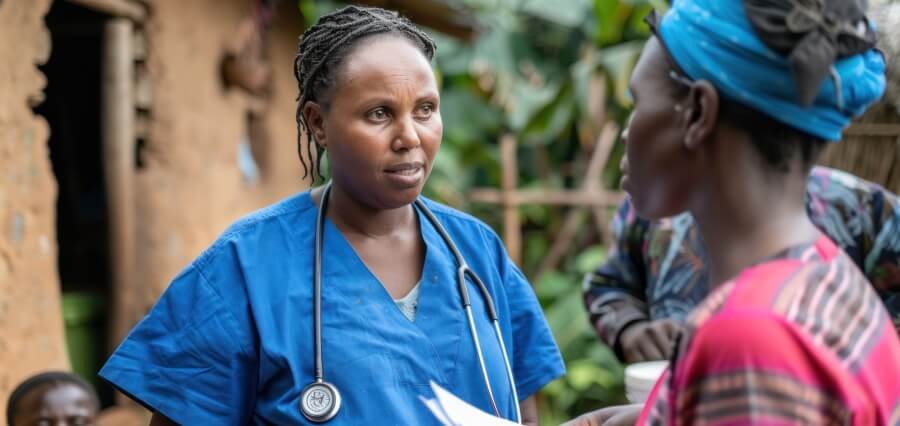#World Health
Global health faces an array of complex challenges that threaten the well-being of populations worldwide. These challenges are multifaceted, encompassing infectious diseases, non-communicable diseases (NCDs), health inequities, environmental threats, and the need for resilient health systems. As the world becomes increasingly interconnected, the urgency of addressing these issues has never been greater. Health leaders are at the forefront of this battle, tasked with navigating these challenges through innovative strategies, global cooperation, and a commitment to equity and sustainability.
One of the most pressing challenges in global health is the persistent threat of infectious diseases. Despite advancements in medicine and public health, infectious diseases like HIV/AIDS, tuberculosis, and malaria continue to claim millions of lives each year, particularly in low- and middle-income countries. Moreover, the emergence of new infectious diseases, such as COVID-19, underscores the unpredictable nature of these threats. The global response to such pandemics has revealed gaps in preparedness and coordination, highlighting the need for stronger international health governance. Health leaders must prioritize the development of robust surveillance systems, ensure equitable access to vaccines and treatments, and strengthen global health security to prevent and respond to future outbreaks.
Non-communicable diseases (NCDs) pose another significant challenge, accounting for the majority of deaths globally. Diseases such as heart disease, cancer, diabetes, and chronic respiratory diseases are on the rise, driven by factors like aging populations, urbanization, and lifestyle changes. NCDs place a substantial burden on healthcare systems and economies, particularly in low- and middle-income countries where resources are limited. Addressing this challenge requires a shift in focus towards prevention and early intervention. Health leaders should advocate for policies that promote healthy lifestyles, such as reducing tobacco use, encouraging physical activity, and improving access to nutritious food. Additionally, integrating NCD prevention and management into primary healthcare systems is crucial for ensuring that individuals receive timely and effective care.
Health inequities remain a profound challenge in global health. Despite progress in some areas, significant disparities persist in health outcomes between and within countries. Factors such as poverty, gender, education, and access to healthcare services contribute to these inequities, resulting in poorer health outcomes for marginalized and vulnerable populations. For instance, maternal and child mortality rates remain unacceptably high in many parts of the world, particularly in sub-Saharan Africa and South Asia. Health leaders must prioritize equity in their strategies, ensuring that resources are allocated in a way that addresses the needs of the most vulnerable. This includes advocating for universal health coverage, strengthening health systems in low-resource settings, and addressing the social determinants of health through multi-sectoral approaches.
Environmental threats, including climate change, pollution, and the loss of biodiversity, are increasingly recognized as critical global health challenges. Climate change, in particular, has far-reaching impacts on health, from increasing the spread of vector-borne diseases to exacerbating food and water insecurity. Rising temperatures and extreme weather events are already affecting millions of people worldwide, with the most severe impacts felt by those in low-income countries. Health leaders must take a proactive stance on environmental health by integrating climate action into health strategies. This includes promoting sustainable healthcare practices, advocating for policies that reduce carbon emissions, and preparing health systems to respond to the health impacts of climate change.
Resilient health systems are essential for addressing the diverse challenges of global health. The COVID-19 pandemic has exposed vulnerabilities in health systems across the world, particularly in areas such as workforce capacity, supply chain management, and emergency preparedness. Building resilience requires health leaders to invest in strengthening health infrastructure, improving health workforce training and retention, and ensuring the availability of essential medicines and supplies. Additionally, fostering collaboration between countries and organizations is crucial for sharing knowledge, resources, and best practices. Health leaders should also embrace innovation, leveraging digital health technologies to enhance the reach and efficiency of health services, particularly in remote and underserved areas.
Global health also faces the challenge of achieving sustainable financing. Many countries, particularly low- and middle-income nations, struggle to fund their health systems adequately. This issue is exacerbated by economic constraints and competing priorities, leading to underfunded health programs and gaps in service delivery. Health leaders must advocate for increased investment in health, emphasizing that robust health systems are foundational to economic development and social stability. Innovative financing mechanisms, such as public-private partnerships and international aid, can play a vital role in closing the funding gap. Additionally, leaders should promote efficiency and accountability in health spending to ensure that resources are used effectively to improve health outcomes.
Collaboration and global cooperation are critical to addressing the challenges of global health. The interconnected nature of modern health threats means that no country can tackle these challenges alone. Health leaders must champion international collaboration, working with global health organizations, governments, and civil society to share knowledge, coordinate responses, and build global solidarity. Initiatives like the World Health Organization’s (WHO) International Health Regulations and the Global Health Security Agenda exemplify the importance of collective action in addressing global health challenges.
The challenges in global health can be mapped and overcome, regardless of their complex nature. Health leaders play a crucial role in navigating these challenges by promoting preventive measures, addressing health inequities, strengthening health systems, and fostering global cooperation. By taking a proactive and collaborative approach, health leaders can contribute to a healthier, more equitable, and resilient world, where all people have the opportunity to live long, healthy lives.




